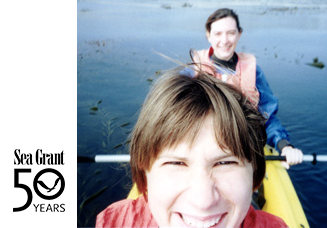As the National Sea Grant College Program celebrates its 50th anniversary, we take a look back at how our program has supported education through graduate fellowships.
In month-long this series, we explore what former California Sea Grant State Fellows have been up to since their fellowship.

Rebecca (Lameka) Pearson, a California Sea Grant State Fellow at the California Natural Resources Agency in 2001, is a program manager at the Great Lakes Observing System in Ann Arbor, Mich.
Before that, Pearson worked as program manager at the Great Lakes Commission. She worked within its Transportation and Sustainable Development Program, conducting social science research on coastal management issues of relevance to the Great Lakes.
Pearson surveyed local municipalities to determine their level of investment in protecting and restoring the Great Lakes. She has had longer commitments collecting social science data for studying connections between land-use policies, recreational boating and dredging on Great Lakes ecosystem health.
Dredging was a topic she also studied while working under Brian Baird, former head of the oceans program at the California Natural Resources Agency. “At the time, California was looking at how to develop regional sediment management plans,” Pearson said. “My main project was to inventory shoreline erosion policies for other U.S. coastal states, which helped inform the development of a state shoreline erosion policy for California.”
Pearson began her position at the Great Lakes Commission immediately after finishing her California Sea Grant State Fellowship in 2002.
“The fellowship absolutely helped me get the job,” she said. She said those interviewing her were impressed by her experience working at a state-level agency with different state agencies and stakeholder groups on a specific issue. “The fellowship was a really good experience in establishing relationships with people wearing different hats.”
Pearson, a native Midwesterner, was a French studies major as an undergraduate at Purdue University in Indiana. She earned a master’s in international environmental policy, with a coastal management focus, at the Monterey Institute of International Studies in California.
Both degrees are serving her well in Michigan. “I’ve worked on projects with French-speaking Canadians,” she said, and she continues to apply what she learned at graduate school in designing new survey methods. Though she no longer studies marine issues, Pearson remains involved with coastal issues, as Michigan is surrounded by four of the five Great Lakes. The people adore their coast the same as in California, she said.
Originally published February 2007



